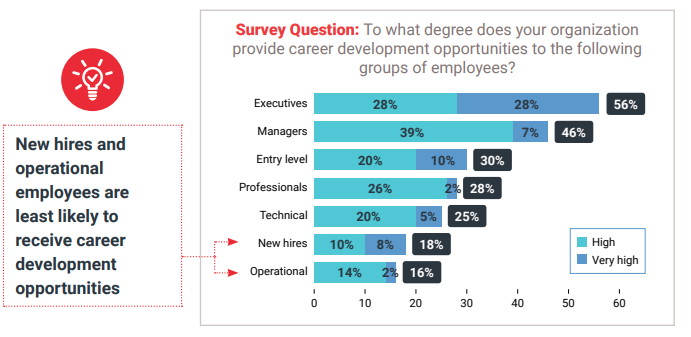



The HR Research Institute is honored to have this esteemed group of professionals join our advisory board to help guide HR.com’s primary research. The advisory board's goals are to influence the HR industry’s thought leadership and best practices and to advance the competencies and skills of HR professionals. Thank you all for your time, effort and passion.
Organizations are most likely to provide career development to a high or very high degree to executives (56%) and managers (46%). We find this worrisome. Of course, employers may feel safer investing in higher level employees than new hires or entry level, partly because (as we noted previously) these employees tend to have higher retention rates. Just 30% of entry-level employees and just 18% of new hires are provided with the same opportunities. However, if career development opportunities are not provided to those in the lower levels of the corporate hierarchy, it may hinder overall retention rates as well as the succession-planning pipeline. Moreover, providing career development opportunities more widely may also serve the dual purpose of boosting overall organizational performance as well as the work experiences of individual employees. We should note that there are a number of key individual contributor jobs where staying current is essential. For example, many organizations provide career levels for highly technical jobs that come with promotions and increases in compensation. It can be especially important to provide career development to such employees.

Just over half (54%) of responding organizations have a learning management system (LMS) and only 33% have a learning experience platform (LXP). Those with career development programs/processes are a little more likely to have such tools (56% and 36% respectively). An LMS can, of course, be beneficial to facilitate learning, control learning content, and track usage, among other important functions. Nearly three quarters (73%) of large organizations have an LMS compared with just 19% of small and 39% of mid-sized organizations. Nearly half (46%) of HR professionals say their organizations use self assessments, though the quality of such assessments tend to vary. Almost two-fifths (39%) say their organizations have competency frameworks. Competency frameworks are crucial for successful mobility, succession and career development as they can match open positions or development opportunities with potential internal candidates.

As elements of their career development initiatives, leaders are far more likely to look at previous work history and assignments (66% vs. 26%) and at the interests and motivations of the employee in question (63% vs. 47%). This suggests that career development leaders are more likely to personalize career development opportunities rather than take a onesize-fits all approach.

